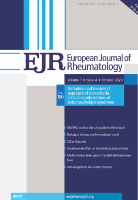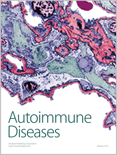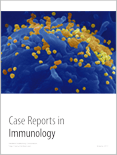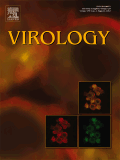
AUTOIMMUNITY REVIEWS
Scope & Guideline
Unveiling breakthroughs in autoimmune disorders.
Introduction
Aims and Scopes
- Pathogenesis of Autoimmune Diseases:
The journal publishes studies exploring the underlying mechanisms of autoimmune diseases, including genetic, environmental, and immunological factors that contribute to disease development. - Clinical Management and Treatment Options:
AUTOIMMUNITY REVIEWS focuses on the latest advancements in treatment strategies, including pharmacological therapies, biologics, and novel therapeutic approaches to manage autoimmune diseases. - Epidemiology and Burden of Disease:
Research highlighting the global prevalence, incidence, and impact of autoimmune diseases on populations is a key area of interest, providing insights into public health implications. - Biomarkers and Diagnostic Tools:
The journal emphasizes the identification and validation of biomarkers for better diagnosis, prognosis, and treatment response monitoring in autoimmune diseases. - Interdisciplinary Approaches:
Articles often integrate insights from various fields such as immunology, rheumatology, nephrology, and neurology, reflecting the complex nature of autoimmune disorders.
Trending and Emerging
- Precision Medicine in Autoimmunity:
Research aimed at tailoring treatments based on individual patient characteristics, including genetic and environmental factors, is gaining traction, highlighting the shift towards personalized approaches in managing autoimmune diseases. - Role of Microbiome in Autoimmunity:
Studies investigating the influence of gut microbiota on autoimmune disease development and progression have increased, emphasizing the connection between microbiome health and immune regulation. - Artificial Intelligence and Machine Learning Applications:
The application of AI and machine learning in diagnosing and predicting outcomes in autoimmune diseases is on the rise, showcasing innovative approaches to enhance patient care. - Impact of COVID-19 on Autoimmune Conditions:
Research exploring the effects of COVID-19 on autoimmune disease incidence, exacerbation, and management has surged, reflecting the pandemic's profound influence on healthcare and autoimmune research. - Environmental Triggers and Autoimmunity:
There is an increasing focus on understanding the role of environmental factors, such as chemical exposures and lifestyle changes, in triggering or exacerbating autoimmune diseases.
Declining or Waning
- Traditional Autoantibody Testing:
Research focusing solely on traditional autoantibody testing methods has decreased as newer diagnostic technologies and biomarkers gain more attention for their potential in precision medicine. - Basic Science without Clinical Relevance:
Papers that delve into purely basic science without a clear connection to clinical implications or translational research appear to be less frequent, indicating a shift towards more clinically applicable research. - Single-Disease Focus Studies:
There is a noticeable decline in publications that focus exclusively on single autoimmune diseases, as the trend moves towards understanding comorbidities and overlaps among various autoimmune conditions.
Similar Journals

European Journal of Rheumatology
Pioneering Discoveries for Better Patient CareEuropean Journal of Rheumatology is a premier, peer-reviewed journal that has been paving the way for innovative research and in-depth analysis in the field of rheumatology since its launch. Published by AVES, this Open Access journal has been accessible to researchers, professionals, and students worldwide since 2014, promoting the sharing of valuable knowledge on rheumatic diseases and their treatment. With an ISSN of 2147-9720 and an E-ISSN of 2148-4279, it provides a prominent platform for groundbreaking studies and clinical evaluations that bridge scientific discovery with practical application. The journal’s mission is to enhance the understanding of rheumatological conditions and facilitate advancements in therapeutic strategies, making it an essential resource for anyone devoted to the improvement of patient care in this dynamic field. The European Journal of Rheumatology is committed to upholding the highest standards of scholarly publishing and aims to foster collaboration among researchers and practitioners across Europe and beyond.

CRITICAL REVIEWS IN IMMUNOLOGY
Connecting Ideas in the World of ImmunologyCRITICAL REVIEWS IN IMMUNOLOGY, published by BEGELL HOUSE INC, is an essential journal in the field of immunology that has been contributing to the scientific discourse since 1980. With its ISSN 1040-8401 and E-ISSN 2162-6472, this journal provides a platform for critical analysis and comprehensive reviews that deepen understanding of immune responses and their implications in health and disease. Although currently categorized in the Q4 quartile for Immunology and Q3 for Immunology and Allergy, the journal's quality research and scholarly contributions are crucial for advancing knowledge within its fields—encompassing various aspects of innate and adaptive immunity. Researchers and professionals in immunology will find invaluable insights, aiding them in their quest for innovation and excellence, as the journal aims to foster interdisciplinary collaboration. While it does not operate on an open-access model, CRITICAL REVIEWS IN IMMUNOLOGY remains a significant resource for those dedicated to pushing the boundaries of immunology, with annual publications expected to last well into 2024 and beyond.

American Journal of Clinical and Experimental Immunology
Advancing Immunology: Bridging Research and Clinical PracticeWelcome to the American Journal of Clinical and Experimental Immunology, a premier publication dedicated to advancing the fields of clinical and experimental immunology. Published by E-CENTURY PUBLISHING CORP, this journal provides a platform for groundbreaking research, case studies, and comprehensive reviews that contribute to our understanding of the immune system and its implications for health and disease. With a focus on disseminating innovative findings and enhancing the dialogue among researchers, practitioners, and students, the journal aims to bridge the gap between laboratory discoveries and clinical applications. Although specific metrics such as the impact factor and Scopus ranks are currently not provided, the journal is committed to maintaining high standards of scholarly publishing and fostering open access to vital research. Located in Madison, WI, and available online via its E-ISSN 2164-7712, this journal is a valuable resource for those wishing to explore the intricacies of immunological research and its applications in clinical practice.

Rheumatology & Autoimmunity
Connecting researchers to foster innovation in immunology.Rheumatology & Autoimmunity, published by WILEY, is an emerging academic journal that delves into the intricacies of rheumatological diseases and autoimmune disorders, providing a critical platform for researchers and practitioners within the field. With an ISSN of 2767-1410 and E-ISSN 2767-1429, the journal aims to disseminate cutting-edge research in both clinical and laboratory settings, enhancing knowledge and understanding among professionals and scholars. Although currently classified in Q4 for Immunology and Allergy, and Q3 for Internal Medicine and Rheumatology as of 2023, the journal is positioned for growth and greater visibility in the scientific community. The three-year publishing span from 2021 to 2024 signifies a commitment to addressing contemporary issues and fostering collaboration among various disciplines related to immunology. As an open access journal, it provides wide accessibility, ensuring that groundbreaking research is available to a broad audience. This journal is poised to become a vital resource for those dedicated to advancing the understanding and treatment of autoimmune conditions.

Journal of Translational Autoimmunity
Translating discoveries into hope for autoimmune health.The Journal of Translational Autoimmunity, published by ELSEVIER, stands at the forefront of research in the ever-evolving fields of autoimmunity and immunology. With an ISSN of 2589-9090, this Open Access journal has been committed to facilitating the dissemination of high-quality research since its inception in 2019. Nestled in the Netherlands, it serves as a vital platform for researchers and professionals focused on translating innovative findings into practical applications for autoimmune disorders. The journal has achieved notable recognition, securing a Q2 quartile ranking in both the Immunology and Immunology and Allergy categories, showcasing its influence within the academic community, currently ranking 70th out of 233 in Medicine: Immunology and Allergy and 83rd out of 236 in Immunology and Microbiology: Immunology. By engaging with cutting-edge studies and fostering collaborative research, the Journal of Translational Autoimmunity is not only a cornerstone of academic inquiry but also a beacon of hope for clinical advancements in the management of autoimmune conditions. Researchers, professionals, and students alike are encouraged to contribute and stay abreast of the latest discoveries that hold the potential to transform patient care.

Autoimmune Diseases
Connecting researchers in the fight against autoimmune diseases.Autoimmune Diseases is a leading open-access journal published by Hindawi Ltd, dedicated to advancing the understanding and treatment of autoimmune disorders. Since its inception in 2010, this journal has provided a vital platform for researchers, clinicians, and students to share innovative findings and insights from the field of immunology. With an impressive Scopus ranking that highlights its relevance, particularly in the areas of Immunology and Microbiology and Immunology and Allergy, Autoimmune Diseases occupies a key position in the scientific discourse, ranking in the top quartiles across various categories. Researchers publishing in this journal benefit from a wide audience and high visibility, reflecting the increasing importance of understanding autoimmune diseases in today’s health landscape. Accessible to all, the journal promotes collaborative research and discussion, making it an essential resource for anyone dedicated to the study and management of autoimmune conditions.

Immunological Medicine
Advancing Immunological Research for a Healthier TomorrowImmunological Medicine, published by Taylor & Francis Ltd, is an esteemed open-access journal that has made significant strides in the field of immunology since its establishment in 2018. With an E-ISSN of 2578-5826, the journal has quickly gained recognition for its contribution to advancing immunological research, evidenced by its impressive ranking in the Q2 quartile for both immunology and allergy. Positioned in the United Kingdom, it offers a platform for publishing high-quality original research, reviews, and case studies that delve into the complex interactions of the immune system and its implications for human health. The journal serves as a vital resource for researchers, professionals, and students engaged in the burgeoning fields of immunology, providing open access to a wide audience and fostering collaboration and innovation. With a current Scopus ranking of #81 out of 233 in Immunology and Allergy and #97 out of 236 in Immunology and Microbiology, the journal aims to enhance the visibility and impact of cutting-edge research by bridging the gap between academia and clinical practice.

Case Reports in Immunology
Empowering Researchers with Open-Access Immunology ReportsCase Reports in Immunology, published by HINDAWI LTD, is an esteemed open-access journal that has been contributing to the field of immunology since its launch in 2011. With both ISSN 2090-6609 and E-ISSN 2090-6617, the journal provides a platform for researchers to publish detailed case reports that explore diverse immunological conditions and novel treatment approaches. This journal is crucial for clinicians, researchers, and students alike, seeking to broaden their understanding of immunology's practical applications and advances. As of 2023, it holds a Q3 ranking in Immunology and Q2 in Immunology and Allergy, reflecting its growing relevance and contribution to the field. Additionally, it is indexed in Scopus, where it ranks #178 in Immunology and Allergy and #192 in Immunology and Microbiology, enhancing its visibility and impact. With a comprehensive accessibility model, the journal is dedicated to disseminating knowledge widely and enriching discussions in immunological research.

ImmunoTargets and Therapy
Pioneering Discoveries in ImmunotherapyImmunoTargets and Therapy is a leading open access journal published by DOVE MEDICAL PRESS LTD, dedicated to advancing the field of immunology and its various therapeutic applications. Since its inception in 2012, the journal has rapidly become a vital resource for researchers, professionals, and students, achieving notable recognition with a Q1 ranking in both Immunology and Immunology and Allergy categories as of 2023. With an impressive Scopus ranking of #22 out of 233 in Medicine - Immunology and Allergy, and #25 out of 236 in Immunology and Microbiology, this journal maintains a 90th percentile standing in its field. ImmunoTargets and Therapy not only publishes original research articles, reviews, and clinical studies, but also fosters an inclusive platform for the dissemination of innovative findings critical to the fight against immunological disorders. Based in New Zealand, it serves a global audience, promoting knowledge exchange and collaboration through its open access model.

VIROLOGY
Illuminating the Impact of Viruses on HealthVirology, published by Academic Press Inc. Elsevier Science, is a prominent journal dedicated to advancing the knowledge and understanding of viral biology and pathogenesis since its inception in 1955. With a distinguished impact factor and recognized as a Q2 journal in the field of Virology for 2023, it ranks 38 out of 80 in the Scopus database for Immunology and Microbiology, placing it in the 53rd percentile among similar publications. This esteemed journal provides a platform for groundbreaking research, critical reviews, and comprehensive studies that contribute to our global understanding of viruses and their impact on health and disease. Although currently not an open-access journal, it remains accessible to a wide audience of researchers, professionals, and students who are keen to explore the latest advancements in virological research. The journal's scope encompasses a diverse range of topics, ensuring that it serves as an essential resource for anyone engaged in virology and related biomedical fields.